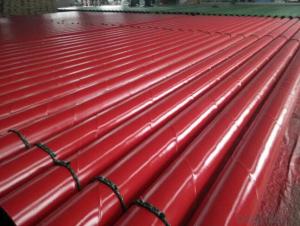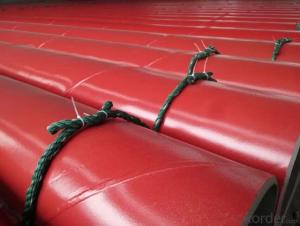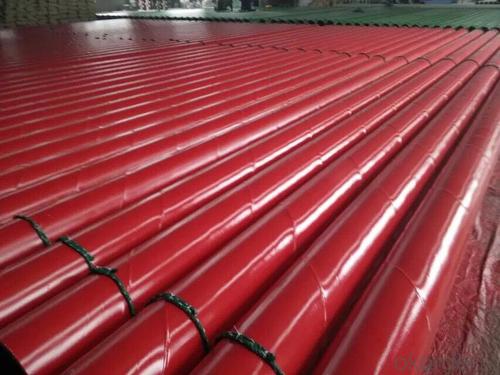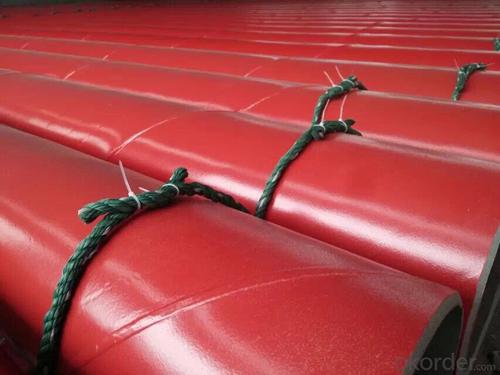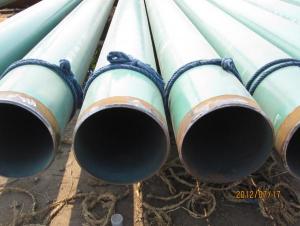LSAW 2PE 3PE steel pipe external coating
- Loading Port:
- China Main Port
- Payment Terms:
- TT OR LC
- Min Order Qty:
- -
- Supply Capability:
- -
OKorder Service Pledge
OKorder Financial Service
You Might Also Like
Specifications
water pipeline inner-layer tape
1 Butyl rubber as adhesive
2. SGS test report and DVGW certificate
3. corrosion protection
water pipeline inner-layer tape
State-of-the-Art Pipeline Protection for All Climates & Environments
System description:
WATER PIPELINE Inner -layer tape also be called pipe wrap anti-corrosion tape, polyethylene wrap tape.
water pipeline Inner-layer tapeT100 is engineered to assure a high bond to the primed pipe surface with excellent conformability characteristics, aggressive adhesive for corrosion protection and repair of main line coatings.
Inner-layer tapeT100 series is cold applied tape coating system for corrosion protection of Oil, Gas, Petrochemical, and Waste Waterburied pipeline, pipe can be buried, also can be underground ,overhead ,onshore and offshore .
Structure of water pipeline inner wrap tape
The specification of the tape consists of two layers, adhesive layer and film backing
Adhesive: butyl rubber
Film backing: Special blend of stabilized polyethylene
Features & Benefits
Provides a permanent bond to the primed steel pipes surface and provides protection against chemical electrolytic corrosion for underground pipelines.
long term corrosion protection
Worldwide reference lists. Established in-ground history
High chemical resistance under service temperature.
Outstanding electric property and permanent adhesion.
Cold applied, No release liner. Makes installation fast and easy.
Complies with EN-DIN 30672 and AWWAC-214 international standards and also ASTM standards.
Be used for water pipeline corrosion protection
System Properties
Type | T138 | T 150 | T165 | T180 | T 250 | T265 | T280 | |
Thickness | 15mil 0.38mm | 20mil 0.508mm | 25mil 0.635mm | 30mil 0.762mm | 20mil 0.508mm | 25mil 0.635mm | 30mil 0.762mm | |
Backing | 9mil 0.229mm | 9mil 0.241mm | 10mil 0.25mm | 10mil 0.25mm | 15mil 0.38mm | 20mil 0.508mm | 25mil 0635mm | |
Adhesive | 6mil 0.152mm | 11mil 0.279mm | 15mil 0.381mm | 20mil 0.508mm | 5mil 0.127mm | 5mil 0.127mm | 5mil 0.127mm | |
When used for ductile iron pipes inner layer 980-20 or 980-25 and outer layer 955-20 or 955-25 are recommended. | ||||||||
Elongation | ³300% | ³400% | ||||||
Tensile Strength | 55 N/cm | 70 N/cm | ||||||
Color | Black | White | ||||||
Peel Adhesion to Primed Pipe | 33 N/cm | |||||||
Dielectric Strength | 30 KV | |||||||
Dielectric Breakdown | 26 KV/mm | |||||||
Cathodic Disbandment | 0.24 in radius 6.4 mm | |||||||
Water Vapor Transmission Rate | < 0.1% | |||||||
Volume Resistivity | 2.5 x 1015 ohm.cm | |||||||
Impact resistance | 5.5Nm | |||||||
Penetration Resistance | <15% | |||||||
Performance | AWWA C-209,ASTM D 1000,EN 12068 | |||||||
Order information
Length | 100ft(30 M),200ft(60 M),400ft(120 M),800ft(240 M) |
Width | 2’’(50mm),4’’(100mm),6’’(150mm),17’(450mm),32’’(800mm) |
- Q: Can steel pipes be recycled?
- Yes, steel pipes can be recycled. Steel is one of the most commonly recycled materials in the world, and steel pipes can be melted down and reused to make new steel products. Recycling steel pipes helps conserve natural resources and reduces the environmental impact of manufacturing new steel.
- Q: What are the different methods of pipe threading for steel pipes?
- The different methods of pipe threading for steel pipes include manual threading, machine threading, and electric threading. Manual threading involves using a handheld die or tap to create the threads on the pipe. Machine threading utilizes power-driven machines that can thread multiple pipes simultaneously, offering efficiency and accuracy. Electric threading is similar to machine threading, but it uses an electric motor to drive the threading process.
- Q: What is the density of steel pipes?
- The density of steel pipes varies depending on their composition, but on average, the density of steel pipes is around 7.8 grams per cubic centimeter.
- Q: Can steel pipes be used for oil wells?
- Yes, steel pipes can be used for oil wells. Steel pipes are highly durable and resistant to corrosion, making them suitable for the harsh conditions and high-pressure environments encountered in oil drilling operations.
- Q: Can steel pipes be used for underground heat exchange systems?
- Yes, steel pipes can be used for underground heat exchange systems. Steel pipes are commonly used for this purpose due to their durability and resistance to corrosion. They can effectively transport and exchange heat in underground systems, making them a suitable choice for such applications.
- Q: What are the different methods of pipe joining for steel pipes?
- Steel pipes can be joined using various methods, each with its own benefits and drawbacks. These methods include: 1. Butt Welding: Two steel pipes are welded together by beveling or facing their ends to form a V-groove. Molten metal is then used to fill the groove, creating a strong and long-lasting joint. 2. Socket Welding: A socket is welded onto the end of a steel pipe, and another pipe is inserted into the socket and welded in place. This method creates a leak-proof and corrosion-resistant joint. 3. Threaded Joint: Steel pipes can be joined by threading the ends and using a threaded coupling or union to connect them. This method is commonly used for smaller pipes and allows for easy disassembly and reassembly. 4. Flanged Joint: For larger pipes, a flange is attached to the end of each pipe, and the flanges are fastened together with gaskets using bolts. This method is commonly used in industries such as oil and gas, water treatment, and chemical processing. 5. Grooved Joint: Grooving machines are used to create a groove on the outside of the pipe. A coupling or fitting is then inserted into the groove and secured with bolts or clamps. This method is quick to install and allows for easy disassembly and reassembly. The choice of pipe joining method depends on factors such as pipe size, application, and desired strength and durability. Each method has its own advantages and disadvantages.
- Q: Can steel pipes be used for transporting slurry?
- Yes, steel pipes can be used for transporting slurry. Steel pipes are known for their durability and strength, making them suitable for handling abrasive materials like slurry. The smooth interior surface of steel pipes helps to minimize friction and prevent clogging, ensuring efficient transportation of slurry. Additionally, steel pipes can withstand high pressure and are resistant to corrosion, making them a reliable choice for slurry transport.
- Q: The difference between carbon and welded steel tubes
- Seamless steel pipe because there is no weld, so can withstand greater pressure, boiler tubes are generally used seamless steel pipe
- Q: How are steel pipes used in HVAC systems?
- Steel pipes are commonly used in HVAC systems for various purposes. They are used for transporting fluids such as water, steam, and refrigerant throughout the system. These pipes are durable and resistant to high temperatures and pressures, making them suitable for the demanding conditions of HVAC applications. They are used for distributing and circulating the heated or cooled air, as well as for connecting different components of the system, including boilers, chillers, heat exchangers, and air handlers. Additionally, steel pipes are often used for ventilation and exhaust purposes in HVAC systems.
- Q: What are the advantages of using steel pipes over other materials like PVC or copper?
- There are several advantages of using steel pipes over other materials like PVC or copper. Firstly, steel pipes are extremely durable and can withstand high pressure and extreme temperatures, making them ideal for various applications including industrial and underground use. Secondly, steel pipes have a longer lifespan compared to PVC or copper, reducing the need for frequent replacements and maintenance. Additionally, steel pipes are more resistant to corrosion and are not prone to cracking or leaking, ensuring a reliable and leak-free plumbing system. Lastly, steel pipes have a higher fire resistance rating compared to PVC, making them a safer option for certain environments.
Send your message to us
LSAW 2PE 3PE steel pipe external coating
- Loading Port:
- China Main Port
- Payment Terms:
- TT OR LC
- Min Order Qty:
- -
- Supply Capability:
- -
OKorder Service Pledge
OKorder Financial Service
Similar products
Hot products
Hot Searches
Related keywords
